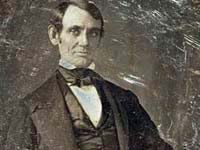HV/Series/Episode/ Work by: Noah Adams · damali ayo · Barrett Golding · Radio Diaries · Dmae Roberts · Tony Schwartz · Jake Warga

![]() Hearing Voices from NPR®
Hearing Voices from NPR®
063 Lincoln Monument: A Civil War
Host: Barrett Golding of Hearing Voices
Airs week of: 2011-06-29 (Originally: 2009-07-01)
“Lincoln Monument” (52:00 mp3):
For Lincoln’s birthday bicentennial year and Independence Day, Old Abe, the Civil War, and its still-present aftermath:
The United States Marine Band recorded a “Lincoln Centennial” on February 12 1909 (from A Lincoln Portrait).
Abe’s 1860 presidential campaign song was “Lincoln and Liberty;” it’s sung for us by Dan Zanes (ex-Del Fuegos, off Parades And Panoramas: 25 Songs Collected By Carl Sandburg For The American Songbag).
“I Heard Lincoln That Day,” says Gettysburg eyewitness Walter Rathvon, in archival audio recorded on Lincoln’s birthday 1938 by WRUL radio, Boston. Set to an instrumental “Lincoln’s Triumph (a Funeral March),” part of the Lincoln Shuffle (by Bryce Dessner, guitarist for The National and Clogs, composed for the great bicentennial site 21st Century Abe, used with their re-mixing blessings).
NPR recreates the “Gettysburg Address,” with the words of John Dos Passos read by Noah Adams, and Lincoln’s speech read by Lars Hoel; produced by Bob Malesky for NPR’s The Sunday Show.
Manny has compiled this nice collection of Lincoln pix (music: Jay Ungar “Ashokan Farewell” 1990, from “The Civil War” documentary), “Abraham Lincoln – A Tribute:”
More stories from the HV hour:
Langston Hughes performs his poem, “Lincoln Monument, Washington; Aunt Sue’s Stories” (1955 The Dream Keeper and Other Poems of Langston Hughes). Carl Sandburg gives a “Lincoln Day Address” to the U.S. Congress on Abe’s 150th birthday (1959-02-12, excerpt), and he is interviewed (1953, excerpt) on NBC-TV Wisdom Series: Conversations with Elder Wise Men. The poets’ pontifications on our 16th POTUSA are mixed with the guitar of “Long Summer” by Bryce Dessner, from his Lincoln Shuffle.
Erich Kunzel conducts the Cincinnati Pops Orchestra with Katherine Hepburn to sound-paint a “Lincoln Portrait,” an Aaron Copland composition (Aaron Copland: Lincoln Portrait & Other Works).
When Daisy Anderson and Alberta Martin first met, it was on the Gettysburg battlefield in Pennsylvania, 1997. They were being honored as the last known living “Civil War Widows,” one Union, one Confederate. Both had married in their early 20s to husbands who were near 80. And both told their stories to producer Joe Richman of Radio Diaries.
Liz Murphy Thomas collaged this videos of videos, “Let Us Praise Famous Men: Abraham Lincoln:”
Let Us Praise Famous Men: Abraham Lincoln from Liz Murphy Thomas on Vimeo.
More stories from the HV hour:
“Civil War Re-enactors” re-dedicate a Union veteran’s grave in Oregon, by producer Jake Warga.
In the 1950s sound documentarian Tony Schwartz asked his fellow New Yorkers what they thought of Old Abe. The result is a voxpop “Portrait of Lincoln” (1962 You’re Stepping on My Shadow).
The late-great John Lee Hooker strums a “Ballad To Abraham Lincoln” (1991 The Original Mr. Lucky).
It only took about a hundred years for this country, the home of the free, to free our slaves. Nowadays, if you see a young black woman sitting on our city’s sidewalks, shaking a can of coins, and holding a sign reading “Reparations Accepted Here,” go up say “Hi.” She’s performance artist damali ayo (produced by Dmae Roberts for Stories1st.org; and on damali’s 2005 What Did She Just Say?).
Two young ladies from Minn MN, who call their band Best Friends Forever (2008 Best Friends Forever), want to marry “Abe Lincoln.”
October 10 is the National Day of Panhandling for Reparations. Here’s a day in the life of damali ayo, “living flag: panhandling for reparations:”
I listened to your recent podcast entitled \Lincoln Monument\, which I thought was excellent. But I take exception to the segment on \reparations\. I understand this is a symbolic act by this woman, but making generalizations about certain members of society, based on skin color, is a very dangerous act. (I would have thought that she would be very sensitive to this fact.) I, as a white person, do not feel responsible in any way for the acts of people hundreds of years ago, none of which were related to me. I suggest to this woman that she take a trip to Africa and hold out her \begging cup\ to the descendants of those black people who sold their own people into slavery, and ask them for \reparations\. I wonder if anyone would give.
Bravo – I agree on Mike comments of reparations – further example being Jews after WWII who got the heck out of Europe as quick as possible – coming to the US or Israel – in fact every year, thousands of Jews migrate to Israel – can the African American boat anything like that. Indeed slavery was a terrible thing – but penalize the seller – not the buyer.
Hi, I’m here because of the reparations segment.
That piece really stuck with me.
I liked her. I like that she’s doing this.
I can’t think of a person who isn’t affected negatively by racism. Here in the US, we are all burdened w/ the legacy of slavery. Whether we know it or not. At the very least (and it is not nothing), she has provided the catalyst for individuals to connect, learn from each other, surprise each other, and reflect.
If we choose to.
Leave a comment: